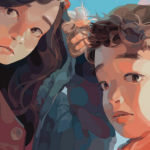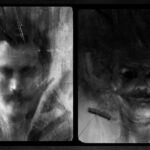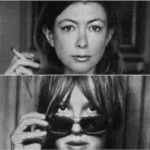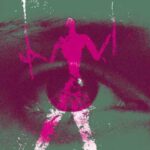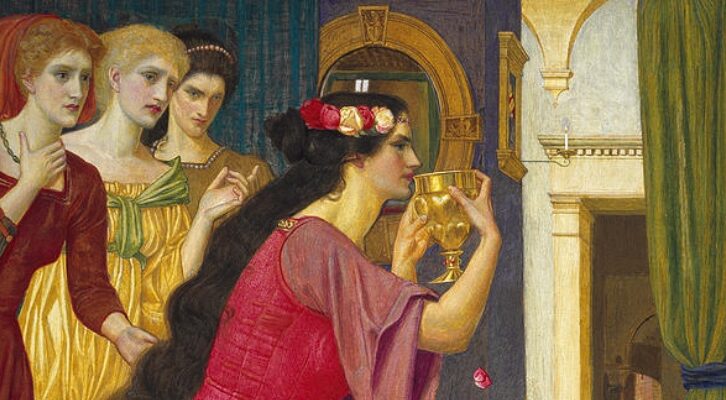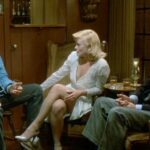Men Who Don’t Know Women: On Unlearning the Lessons of “Dick Lit”
Molly McGhee on David Foster Wallace, Violence, and Writing Her Own Novel
As a child, I read men.
Before I turned eighteen I read Hemingway, Fitzgerald, Salinger, Portis, Melville, McCarthy, and Faulkner. I loved Brave New World, A Clockwork Orange, Fahrenheit 451, The Invisible Man, and 1984. I devoured Vonnegut, and Bukowski. I worshiped at the altar of Kafka, Dumas, Conan Doyle, and Poe. Chandler, as well, how could I not? I didn’t give a shit about Kerouac or Ginsberg, though I admired Brautigan, and, sure, Carver and Coover, too. I skimmed everything Palahniuk wrote, doted over the hitch-hikers of Adams, and suffered (truly suffered) through Ellis. I read Dostoyevsky. I read Tolstoy. I was obsessed with Nabokov, particularly Lolita.
I later learned that my teenage tastes fit neatly into a genre called “Dick Lit.”
You can probably guess who my favorite writer was at the time. His name is now synonymous with the genre.
Yes, I am yet another MFA Bro who loves David Foster Wallace. Him, and the men usually shelved alongside him in personal collections: Saunders, Borges, Bolaño, Pynchon, Barthelme, Joyce, and Beckett. These were the men who helped me discover the art of writing, and now, like the “Guy in your MFA,” I too have a novel coming out about a sad dude who is unlucky in life and love.
*
My first encounter with Foster Wallace’s bibliography was Brief Interviews With Hideous Men. My favorite story is an interview with a man about how he fell in love with and manipulated a woman after learning she had been raped.
I especially liked reading stories where men broke down into madness, vice, crime, and other vile behaviors, especially men whose actions hurt or killed the women around them. Now I look back on this time and realize that I was obsessed. The reason I was obsessed with these stories is because they felt true.
These were the men who helped me discover the art of writing, and now, like the “Guy in your MFA,” I too have a novel coming out about a sad dude who is unlucky in life and love.Men were centered in my daily life. Men did behave as if they were mad. Men were violent, and terrifying, and they did not care about me, or the women around me. They operated by different rules than the rest of us. They frequently broke into insane fits of passion, where their fists found walls or faces to go through, and their voices were raised to volumes previously unfathomable. Afterwards, they were insistent upon their sole ability to apply “cold, pure, logic” to the matter at hand.
Around the age when this literary obsession was the most intense, I was recovering from the horror show that was my first boyfriend, living with my mother and the felon she was in love with. I was in my teens. I was failing at managing my cross-gender friendships. When I wasn’t sent home for violating the dress code I spent my days at a high school that employed two teachers who later would commit statutory rape.
As I moved towards sexual legality, my male friends were becoming increasingly violent, and demanding, yet they themselves seemed oblivious to their newly developed appetites. In these two years guns were held in my face, hands were wrapped around my throat, and two separate men broke the windows of my house in an attempt get in: one of them to see my mother, and one of them to see me.
These are just the things I feel comfortable telling you about.
And yet all around me, in media and narrative, men were lauded as rational. In church I was told that knowledge could only be accessed through men, because men alone knew God. Every piece of media I watched or consumed (from Kaufman, to the Cohen brothers) was concerned solely with the interiorities of men.
And yet I insisted on reading about them, too. At least the authors, I thought, knew what was up. The pure insanity and inequality of gender seemed to me most evident in the pages of David Foster Wallace and his ilk, whose women characters bore so much weight in the narrative it was almost impossible to capture them on the page. Like black holes, the women could not be understood or depicted. Any attempt to include them broke the narrative, so that the story itself began to bend into, an eventually collapse onto, the women themselves.
*
My favorite Hemingway was For Whom The Bell Tolls. I liked Maria. My favorite Fitzgerald was his letters. I liked Zelda. I liked the god-filled literature of Vonnegut, especially in comparison to his personal communication, where he lambasted his wife for being a whore. I liked A Clockwork Orange. The brutality reminded me of my classmates: rapists, racists, hunters, and God-fearing drunks. Why did I like Lolita? She reminded me of myself.
Here, in books, were the realities I encountered every day that I had been told over and over again did not exist.
At the center of all my favorite novels were women who were ciphers. Women who suffered the men around them. Women the narrator did not understand. Women the protagonist either fell in love with, scorned, pitied, or feared. Women whose interiority was obscured to the point of occlusion. Women who, at the last minute, revealed that everything the characters thought they understood about them was really just an illusion, after all.
It wasn’t until I went to college and spoke about reading Foster Wallace with my classmates that I realized other people did not see the power in capturing the pathetic death throes of (white) male-dominated reality in these novels, and instead saw the text of Foster Wallace as a glorification of masculinity. At first I couldn’t believe it. His themes were obvious critiques to me, chronicling all the traps masculinity entails: emotional castration, overt reliance on violence as communication, sexual manipulation that ultimately isolates the manipulator, spiritual emptiness, praise of silence, and a dedication to uphold the individual at all cost, especially at the cost of the individual themselves.
I had misread the authors I had surrounded myself with, I realized. Or maybe it was everyone else who misread them. I thought Fight Club was an over-the-top obvious screed against the degrading roles capitalism forced modern men into. Yet, all around me people were proudly quoting the first rule as if the lack of communication wasn’t what fueled the story’s tragedies. I thought Infinite Jest was a novel about addiction to narratives, first and foremost the narrative of linear gender and the ways it traps you into self- and familial-destruction. I realized that most readers and (many) writers were no more aware of these textual ironies than the men in my own life whose creative work I loved and respected.
Even my favorite people were overwhelmingly preoccupied with Scott Pilgrim-esque fantasies of “winning” a “dream girl.” The exclusion of complex women wasn’t intentional, I realized with horror. It wasn’t some winking joke we were all in on. It wasn’t a grand metaphor for the way life was. It was accidental. It was out of ignorance. All of the women symbolized or stood for the status of the man they were in relation to.
These authors truly did not know women, and as such could not depict them as alive on the page. It was the failure of the artists themselves that caused the women to disappear in their texts. The great parallels between their work and my reality—and the comfort I subsequently found there—had been something that I had brought to the work myself.
I could write about Hemingway and his lesbian mentors, Vonnegut and his Madonna complex, Fitzgerald and his marital thievery, but instead I want to focus on Joelle Van Dyne: the leading lady of Infinite Jest who also goes by the moniker Madam Psychosis.
These authors truly did not know women, and as such could not depict them as alive on the page.Joelle is so crippled by her own beauty and the onslaught of male desire that accompanies it she is no longer capable of existing publicly, and instead must resort to wearing a veil in public in order to be treated humanely. So great was her beauty that even her own father sexualized her. All the men in the novel orbit Joelle: fathers, sons, and addicts alike.
In Don Gately’s dream, she appears to him as a symbol of death. The men of the Incandenza family obsess over her, at their own peril. There is a missing video tape that is rumored to contain her image, and is so entertaining that to watch it is to become instantly addicted. This addiction “kills” the viewers capacity to experience joy in other areas of their life. Throughout the text it is unclear if Joelle is actually disfigured, or if her beauty (and her gender) is itself the disfigurement: so overpoweringly ‘other’ that no one can treat her as human unless she wears a disguise.
This metaphor seemed so overwhelmingly obvious and true. I wondered and still wonder, did Foster Wallace himself know what he had done?
*
I did not escape the influences I’ve documented here. Most of the time I’m not necessarily bothered by this, though occasionally I am struck down by lightning bolts of shame. I remember reading Max Fischer’s biography of David Wallace and seeing myself in Mary Karr, who Wallace had an intense relationship with in the nineties. He pushed her out of a moving car and then later broke into her house. Yet later still, in an interview with Laura Miller, he mentioned her as one of the best poets working at the time. I had boyfriends like that. I often wondered whether they knew how cruel and confusing their behavior was.
His ignorance at his own foibles coupled with his inability to escape them in his fiction—in fact his almost orbital and predictable return to misogyny in his work—is perhaps the greatest tragedy and most central element of his legacy, and does not surprise me. I have read, after all, everything he has written and almost everything written about him.
One of my favorite articles of criticism about him is Zadie Smith’s “The Difficult Gifts of David Foster Wallace.” Smith was one of the first novelists I read who was a woman. I read White Teeth, and marveled at its ambition, voice, and scope. I also read James Wood’s takedown of White Teeth. Smith was twenty-three when the novel was published. After White Teeth and Wood’s review, Smith’s style noticeably changed, her voice became more cultured, her prose less recursive, her stories less “hysterical.”
I missed the hysteria. Hysteria seemed warranted to me. Is this world not absolutely mad? Do we not engage with people every day who love us and hate us in equal measure because of what we represent or the potential we contain? I find influences do not cause either ecstasy (per Jonathan Lethem) or anxiety (Harold Bloom), but are instead a type of map we can follow to understand how an artist came to the literary tradition. It is an inevitable and embarrassing reality for every human that we learn not from ideal sources, but flawed ones. As we move through time our educators are inevitably revealed to be mortal after all.
So, yes, perhaps it is not surprising that the women in my debut novel, Jonathan Abernathy You Are Kind, are themselves ciphers. Their stories obstructed, obscured, and ever-changing, not because of their innate dishonesty, but rather because of the eponymous Jonathan’s willful ignorance and disinterest in the narratives around himself.
Sometimes I would like to be like my protagonist Jonathan. How freeing it might be to ignore the reality of others and think of the world only through the story of yourself.Sometimes I would like to be like my protagonist Jonathan. How freeing it might be to ignore the reality of others and think of the world only through the story of yourself. He is obsessed with being “the best” of “figuring it out” and in the process “taking care” of all the women around him. He goes out of his way to convince others, especially women, that he is someone fundamentally different than who he actually is.
The women in his life alternatively believe him, love him, suffer him, or think he’s full of shit. Often, they have all of these feelings at once. Irony is, after all, a tricky, multifarious thing, changing each time we examine it, or try to pin it down, as David Foster Wallace wrote about at length in his own work. Life and art are full of hideous contradictions.
Understanding the difference between irony, empathy, cruelty, and sincerity is often dependent on understanding the context, and context can only be gained in the passage of time. Like a chimera, our understanding of life and our relation to one another is constantly changing. In every decision we make, we further become ourselves, and often the self we become is not the self we expected to be.
______________________________

Jonathan Abernathy You Are Kind by Molly McGhee is available via Astra.



